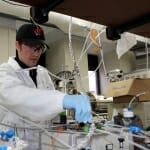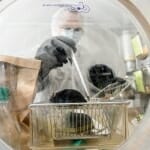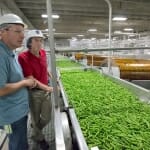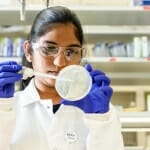Tag Research
Where the ocean meets the sky, chemists look for clues to our climate
Chemists at the University of Wisconsin–Madison are studying how our past, present and future climates are affected by a complex aerosol made up of seawater, air and bits of organic matter from the organisms that call the ocean home.
NOAA listening session to focus on weather research, forecasting improvements
“It’s an honor to have NOAA leadership visiting campus,” says Associate Vice Chancellor Steve Ackerman. “It acknowledges our history and expertise in this area of science and recognizes that we have important contributions to make."
Could yesterday’s Earth contain clues for making tomorrow’s medicines?
UW-Madison researchers have described initial steps toward achieving chemistries that encode information in a variety of conditions that might mimic the environment of prehistoric Earth.
UW–Madison physics professor receives Moore Inventor Fellowship
Victor Brar is making new light sources the old-fashioned way, developing one to fill a niche where lasers are too expensive and LEDs inefficient.
After 20 years, stem cells mean business in Wisconsin
At least 10 Wisconsin businesses fundamentally depend, in one way or another, on pluripotent stem cells. In our continuing series, we profile each of these companies, spun off from UW–Madison research.
UW-Madison students make discoveries, explore Italy in archaeological expedition
Two seniors traveled to the ancient city of Agrigento on the south coast of Sicily this past summer, to develop a more accurate historical timeline.
Randolph Ashton named SCRMC associate director
Ashton, a leading UW–Madison stem cell scientist whose lab develops novel tissue engineering methods to derive brain and spinal cord tissues from human pluripotent stem cells, will assume a leadership position with the Stem Cell and Regenerative Medicine Center.
Professor takes on climate change by promoting science literacy through music, art, comics
A UW–Madison geoscience professor has come up with new ways to teach science to non-science undergraduate students, in hopes of awakening their "inner scientists."
Food processors, UW collaborate to remove guesswork from wastewater disposal
The results of a three-year study offer some support for the belief that much of the nitrogen in the wastewater from cheese-making and vegetable processing leaves the soil and harmlessly enters the atmosphere.
Twenty years on, measuring the impact of human stem cells
Beginning with just five cell lines derived from surplus embryos donated by patients who had finished undergoing fertility treatments, human stem cell science has mushroomed from just a few isolated labs to a burgeoning global industry and launched the new field of regenerative medicine.
Stem Cells @ 20: Students find inspiration, support in UW–Madison’s stem cell community
When Kaivalya Molugu was considering graduate schools, she knew she was interested in stem cell research, but she had to decide where to apply. The answer soon became clear: the place where it all began.




















